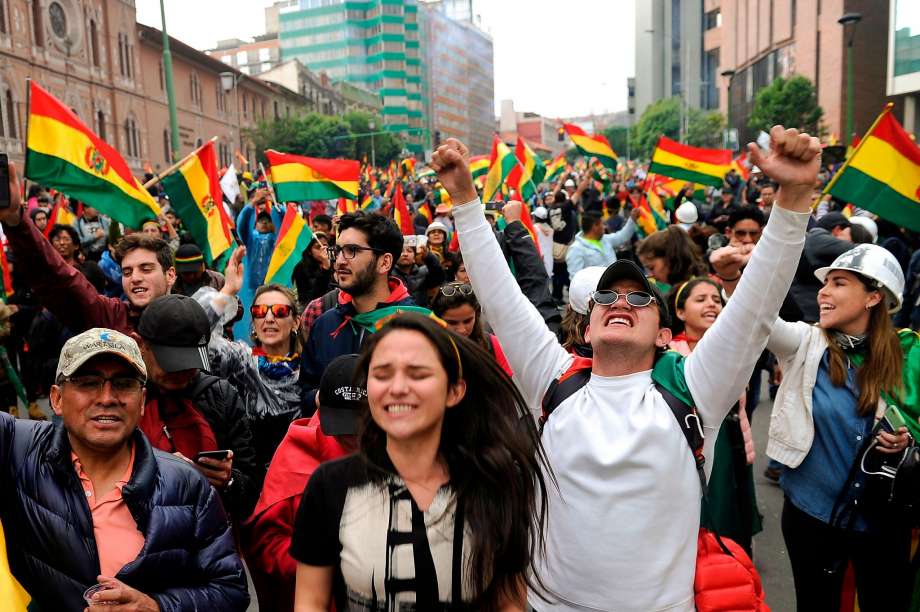RIO DE JANEIRO, BRAZIL – On Tuesday, the second vice-president of the Senate, the opposition senator Jeanine Áñez, declared herself the acting president of Bolivia, despite the lack of a quorum in Congress.

Two previous attempts by the Senate and the Chamber of Deputies to establish a quorum had failed because there were insufficient deputies present, due to a boycott by members of Morales’ political party MAS.
The 52-year-old must now organize a new election within 90 days. She referred to the “need to create a climate of social peace” in a country shaken by a deep political crisis.
Evo Morales is now in exile in Mexico. A plane of the Mexican Air Force with the left-wing former head of state on board landed at Mexico City airport on Tuesday. The plane had picked him up in Bolivia and made a refueling stopover in Paraguay.
According to Mexico’s Foreign Minister Marcelo Ebrard, the plane went through an “odyssey through Latin American politics” because there were problems obtaining overflight and landing permits from various countries.
According to Ebrard, Mexico had offered Morales asylum for humanitarian reasons. His life in Bolivia was in danger. Mexico’s government regards Morales’ resignation as the result of a military coup. Mexico sees itself as a country that traditionally offers protection to politically persecuted people.
1. What has happened?
Evo Morales, the longest-ruling head of state in Latin America, announced his resignation on November 10th. He resigned after weeks of protests against the alleged manipulation of the October 20th presidential election. During the counting of votes, a second ballot between Morales and his opponent Carlos Mesa became imminent.
However, the electoral authority interrupted the announcement of results for more than 24 hours without providing grounds. When the announcements were resumed, Morales was slightly over ten percentage points ahead of his opponent – which would have given him the needed edge to prevent a second ballot.
An observer commission of the Organization of American States (OAS) described it as “statistically unlikely” on the morning of November 10th that Morales had indeed exceeded Mesa by more than ten percentage points. There had clearly been some manipulation – the electoral authority is deemed to be in line with the government. The observers recommended new elections.
Morales quickly heeded the recommendation. However, he had already lost control. Sections of the Bolivian police had already sided with the demonstrators on Friday. Over the course of Sunday, numerous female ministers and other officials resigned, including the presidents of both chambers of Parliament. In the evening, the army command recommended that Morales resign. Shortly afterwards, Morales and Vice-President Alvaro García Linera announced their resignation.

2. What happened after the resignation?
After Morales had announced his resignation, celebrations broke out in many parts of the country. In the center of La Paz, demonstrators lit fireworks, waved national flags and sang the national anthem.
In Santa Cruz, the largest city in Bolivia, a stage was set up on which music bands played. But a little later the festive mood turned into violence.
Supporters of the ruling party MAS (Socialist Movement) marched through La Paz and other cities, set fire to homes and plundered shops. The demonstrators, armed with stones, sticks, and dynamite, attacked company buildings and private homes of opposition leaders.
In Cochabamba, the country’s fourth-largest city, groups of motorcyclists attacked people celebrating the president’s resignation in the streets.
The police only intervened on Monday. They did, however, make an effort to contain the violence. On Monday, the army commander, Williams Kaliman, announced that the military would carry out operations to pacify the situation.
3. Is there a coup in Bolivia?
Morales described the events in the country when he announced his resignation as a coup. Numerous left-wing politicians in Latin America supported this statement, including former Brazilian President Lula. Indeed, Morales resigned after the army command made it clear to him that they would no longer support him.
However, the army, for which Morales had made great efforts during his reign, did not forcibly remove the president. Even after Morales’ resignation, the army remained remarkably cautious and made no attempt to take power. Even the leading figures of the opposition, among them the presidential candidate Carlos Mesa, did not claim the presidency.
Bolivia has a long, inglorious history of coups. Historians report over 185 irregular changes of government since Bolivia’s independence in 1825.

4. Who rules Bolivia now?
The governing party MAS controls both legislative bodies. Following the resignation of Morales, Senator Jeanine Áñez declared herself interim president on Tuesday. Two attempts by the Senate and the Chamber of Deputies to establish a quorum had failed because there were not enough deputies present.
She has been a Senate member for the Beni Department (a northeastern department of Bolivia) since 2010. Since Morales, the Vice-President, the President of the Senate and the President of the Chamber of Deputies had also resigned, the second Vice-President of the Senate moved to the top of the line of succession. The 52-year-old must now organize a new election within 90 days.
5. What legacy does Morales leave behind?
The merits of Evo Morales are undisputed. He was the first indigenous president of a country whose indigenous majority had long been marginalized by a small European elite. During Morales’ reign, the economy grew by some five percent annually, and the poverty rate among the population fell from 60 to 35 percent.
Income inequality has also been reduced to an extent unparalleled in any other country in the region. Morales, therefore, enjoyed widespread popularity for a long time.
During his term of office, however, Morales developed increasingly authoritarian traits, corrupted the media, and overruled a referendum in 2016 in which a majority of Bolivians rejected the abolition of the restriction on terms of office.
With the obvious manipulation of the election this year, the tensions widened. The protests against Morales were more forceful than in the past – they ultimately led to the president’s resignation.

